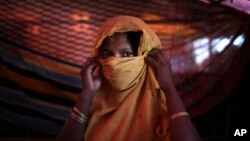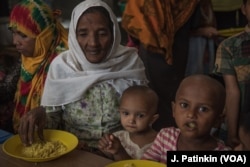Trapped inside "prison-like" tents in Bangladesh's refugee camps because of fears they will be trafficked or sexually harassed, teenage Rohingya girls dream of going to school and playing outside, aid agencies said on Wednesday.
Adolescent girls are confined to one-room bamboo and tarpaulin tents so as to avoid men, only venturing out in the early hours to relieve themselves, the children's charity Plan International said on World Refugee Day.
"They spend almost every hour of every day inside their sweltering tents, where the only activities they have to keep themselves occupied are cooking and cleaning," said Orla Murphy, Plan International's Bangladesh director.
"There is a real hunger for social interaction, the feeling of normality," she told the Thomson Reuters Foundation.
The number of Rohingya in camps in Cox's Bazar has swelled to almost 1 million since last August, when an army operation in Myanmar following Rohingya insurgents' attacks on security forces prompted an exodus to Bangladesh.
With the start of the monsoon season, the government is working to relocate tens of thousands of people amid fears of landslides and waterborne diseases.
Plan International interviewed 300 girls aged between 10 and 19, many of whom said they have little or no freedom to go outside and they only spend time with their families, reminiscing about happier times back home in Myanmar.
"In Myanmar if I wanted to play, I could, but I cannot play here," 11-year-old Noor told Plan International in a report that described adolescent girls' lives as 'prison-like.' "I had friends and went to school. I was really interested to learn English and tailoring. But there is no school here."
Children's charities only run temporary "learning centers" for some refugee children up to the age of 14 because Bangladesh does not allow formal schooling in the camps.
With a growing number of Rohingya refugees being sold to older men as child brides by human traffickers, and widespread domestic abuse, rights groups called for more services to protect girls, from education and security to toilets.
"They become susceptible - sex tourism thrives here," said Nafeesa Shamsuddin, a spokeswoman for Bangladesh's BRAC charity. "Pimps target these vulnerable girls."
While younger girls can be seen hauling bags of grains and firewood, fetching water or looking after babies, they are forced into isolation when they reach puberty, said Daphnee Cook, a spokeswoman for the British charity Save the Children.
"Many childhoods end around this age," she said. "The perception is that these girls are now women and will face more risks."












